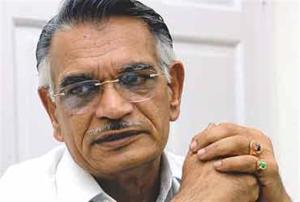 Chandigarh, Punjab Governor and UT Administrator Shivraj V Patil, on Tuesday, said that Chandigarh should not be changed into a trading or industrial city. Rather it should remain an administrative city, he said.
Chandigarh, Punjab Governor and UT Administrator Shivraj V Patil, on Tuesday, said that Chandigarh should not be changed into a trading or industrial city. Rather it should remain an administrative city, he said.
As his five year term ends on January 22, Patil told Newsline that those who want to set up an industry should explore options in Panchkula and Mohali or beyond.
“This city has been declared by an administrative city like New Delhi or Washington, or any other city where the emphasis would be on providing facilities for good governance and good administration rather than facilities for trading activities or industrial activities,” he said.
Patil said that “as far as industrial and trading activity is concerned, we are depending on asking Panchkula and Mohali to do something in that aspect and allow this city to provide administrative facilities in the best possible way.”
There is division of work between the three cities, he said while adding that if people have to go 10 kilometres out of the city to get a certificate made that would be a problem for them.
The administrator went on to say that when it was found that there were some industries in New Delhi and old Delhi too, the High Court and Supreme Court directed that these to be shifted outside. This was done to ensure that they do not pollute and to see that the city which has been working to provide administrative and other kinds of facilities for governance are provided freely and in the best possible manner. It is the same principle we have here, he added.
Patil said that the essence of the Master Plan is to see that the character of Chandigarh is not disturbed. “I have approved the Master Plan at my level as per law and sent it to the Government of india for its information and suggestions. We received a letter from them they have no suggestions. The Master Plan will remain in existence for many, many years to come,” he said.
Patil also stated that 90 per cent of the people here want that the character of the city be maintained as it is. It is only 10 per cent who want that they should be allowed to make changes.
Breaking News
 Driving Naari Programme launched in Chandigarh
Driving Naari Programme launched in Chandigarh Punjab farmers reaping benefits of Mann Government’s crop diversification initiatives
Punjab farmers reaping benefits of Mann Government’s crop diversification initiatives Punjab and Kerala Join Hands to Address NRI Concerns
Punjab and Kerala Join Hands to Address NRI Concerns Macron refuses French Prime Minister’s resignation after chaotic election results
Macron refuses French Prime Minister’s resignation after chaotic election results Modi lands in Russia for first visit since Ukraine offensive
Modi lands in Russia for first visit since Ukraine offensive Saudi Arabia approves granting citizenship to global experts under Vision 2030
Saudi Arabia approves granting citizenship to global experts under Vision 2030 Vigilance arrests Panchayat Secretary, former Sarpanch for embezzlement in Panchayat funds
Vigilance arrests Panchayat Secretary, former Sarpanch for embezzlement in Panchayat funds Housing crisis in Canada forcing residents to move out of pricier cities: Poll
Housing crisis in Canada forcing residents to move out of pricier cities: Poll Historic Milestone: Canada Appoints Its First Female Chief of Defense
Historic Milestone: Canada Appoints Its First Female Chief of Defense Victory parade of T20 World Cup-winning Indian cricket team concludes in Mumbai
Victory parade of T20 World Cup-winning Indian cricket team concludes in Mumbai Maximizing impact of Aadhar in Punjab
Maximizing impact of Aadhar in Punjab Amritpal Singh to take oath as Khadoor Sahib MP on July 5
Amritpal Singh to take oath as Khadoor Sahib MP on July 5



































